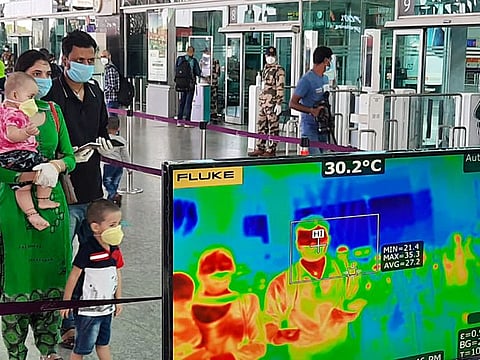UAE airlines' hopes for Eid, summer demand hit by India's COVID-19 mutant
Other key markets too hit, with Bangladesh earlier placing an air travel ban

Dubai: UAE’s airline and tourism sector hoping for a demand boost from India for the Eid and summer breaks have reasons to be worried by the COVID-19 surge sweeping through the country.
Indian states have again imposed partial lockdowns as daily infection numbers have gone past the 200,000 mark. More troubling is the detection of a ‘double-mutant’ COVID-19 strain, and which will have expat Indians in the UAE and Gulf making plans to visit home to hit a pause.
“News of the ‘Indian’ variant of the virus is a blow to the hopes of a stable recovery in passenger traffic in the region,” said Orkun Altintas, regional Director of Consulting - Aerospace & Defense Practice, at Frost & Sullivan.
India isn’t the only South Asian nation to re-impose tougher measures, albeit partially. Bangladesh had earlier imposed a week-long air travel ban amidst a spike in COVID-19 cases.
All of this do not bode well for Gulf airlines. With travel restrictions still in place in US and Europe, they were increasingly training their recovery hopes on Asian routes as well as within the wider Middle East and North Africa.
Destinations such as Mumbai, Delhi, Islamabad, Karachi, Dhaka and Colombo are crucial both from and to the UAE, and always figure in the top 10-15 destinations in terms of seats offered, said Altintas. “A decline in demand for travel due to risks related to the new strain will undoubtedly be a key factor in the slump that will hit traffic recovery.”
Fare situation
Fares to Indian cities from UAE have dropped significantly, with a one-way Emirates ticket from Dubai to Delhi as low as Dh393. An economy seat to Mumbai will cost a traveller between Dh285-Dh389. Kochi, the South Indian city, is a bit on the higher side at Dh580. A seat to Bangladesh’s capital Dhaka will cost Dh770 to Dh952. A ticket to Karachi – Pakistan’s largest city – can be had for just Dh400.
In recovery... and then
The Dubai-Delhi route was the third busiest sector for the global airline industry during March, and just behind the Orlando-San Juan services and Hong Kong-Taipei, according to aviation data company OAG. More than 146,000 seats were utilised in Delhi-Dubai flights, behind Orlando-San Juan’s 171,010 seats and Hong Kong-Taipei with 146,536 seats last month.
Bubble agreements
The surge in coronavirus cases will not just bring domestic air travel in India to a standstill, but also test the country’s ‘bubble’ deals with other countries. ‘Transport Bubbles’ are temporary arrangements between two countries aimed at restarting commercial passenger services when regular international flights are suspended as a result of the pandemic.
SriLankan's gain
This programme, although seen as a move to protect India’s aviation markets, has given a fresh lease of life to regional airlines. One of them is SriLankan Airlines.
Recently, India signed an air bubble agreement with Sri Lanka, allowing the operation of international flights between the two nations. This was seen as a huge boost Sri Lanka’s national carrier, which does not have a vast domestic market of its own to drive demand.
“India is domestic travel for us, because we are a very small island - so once India kick starts we will be okay,” Vipula Gunatilleka, SriLankan’s CEO, during an industry event last week. “Margins are under pressure to an extent but then again, there's enough demand.
“Sri Lanka is one of the most sought after destinations by the Indian middle-class.”
Air corridors necessary
“Whether for local demand or connecting traffic, post-COVID-19 recovery of passenger volumes will take place through a stage-by-stage approach,” said Altintas. “The key foundation of this chain will be the establishment of air corridors, which are made possible when borders are reopened and travel restrictions are relaxed.”
For now, outlook for the recovery of traffic between the UAE and South Asian destinations looks bleak.
Sign up for the Daily Briefing
Get the latest news and updates straight to your inbox









